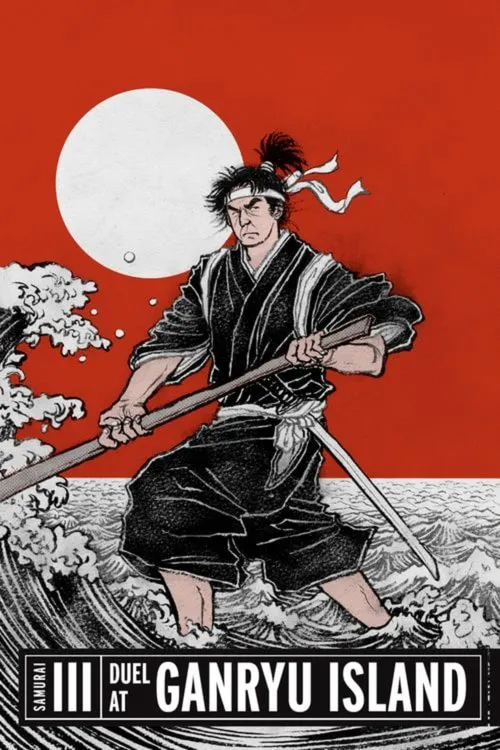Samurai III: Duel at Ganryu Island

Plot
Samurai III: Duel at Ganryu Island is the final installment of the Musashi trilogy, based on the life of the legendary Japanese swordsman Miyamoto Musashi. The film is a historical epic that delves into the complexities of Musashi's character as he navigates his personal life and confronts his greatest challenge on the island of Ganryu. The narrative begins with Takezo, Musashi's alias, abjuring his life as a knight errant, driven by a deep sense of self-discovery and disillusionment with the code of conduct that governed the actions of samurai. His decision is met with surprise and rejection by his contemporaries, particularly Shogun Ōgasawara, the most powerful clan leader in Japan, who seeks to induct Musashi into his ranks as teacher and vassal. However, Musashi declines, citing his need to distance himself from the intrigue and corruption that seems to permeate the highest echelons of Japanese society. This moment of defiance is followed by an equally intriguing proposition from the enigmatic Sasaki Kojiro, who challenges Musashi to a duel on the island of Ganryu. With characteristic aplomb, Kojiro stakes his name and reputation on this duel, asserting his claim as the greatest swordsman in all of Japan. Musashi, unwilling to commit to a duel at that moment, agrees to meet Kojiro a year later, thus setting in motion a dramatic sequence of events that will forever alter the course of his life. Meanwhile, Musashi's personal life becomes more complicated as he is pursued by two love interests: Otsu, a young woman who has long been devoted to him, and Akemi, a mysterious and alluring courtesan. Both characters embody qualities that Musashi desires yet seems unable to reconcile within himself. Otsu, with her innocence and sincerity, represents a connection to his past and the values of traditional Japanese society. Akemi, on the other hand, embodies the allure of the unknown and the seductive power of his own ambition. In the intervening period, Musashi becomes increasingly isolated from the outside world as he chooses to cultivate the wilderness, learning to live off the land and cultivating the earth. He sees this as a way to connect himself with nature, something that is essential for true spiritual growth and understanding. However, this new lifestyle is also marked by a new sense of loneliness as he struggles to comprehend the conflicting desires that rage within him. In a pivotal moment, Musashi returns to Otsu, confessing his love for her and seeking her forgiveness after having hurt her in the past. This moment of vulnerability offers the viewer insight into Musashi's complexities as a character – he is neither a one-dimensional hero nor a purely romantic interest, but someone who embodies the very paradoxes that the traditional samurai code of conduct struggled to resolve. Ultimately, Musashi's journey comes full circle as he sets sail for Ganryu Island to fulfill his obligation to Kojiro – a duel that will either seal his destiny as Japan's greatest swordsman or expose the limits of his ability. The island itself becomes a metaphor for the internal struggles that Musashi has undergone, as he wrestles with the choices that have defined his life thus far. The duel between Musashi and Kojiro, set against the stunning backdrop of a natural landscape, serves as a commentary on the nature of power, courage, and the self. Both combatants demonstrate their mastery over their craft, exemplified in their unwavering dedication to the art of dueling. Their clash, which takes place with unyielding intensity and discipline, offers a glimpse into the transcendent world of the samurai, where strength is not merely physical but also symbolic and philosophical. Ultimately, the film culminates in a profound display of the duel at Ganryu Island where Musashi is forced to confront not merely his opponent but his own sense of self-worth, values and what he hopes to achieve in life. The film ends on a note of poignancy, suggesting that true heroism may often mean confronting one's own limitations and vulnerability rather than mere strength or victory. Through Samurai III: Duel at Ganryu Island, the filmmakers present a nuanced exploration of Musashi's character, revealing him to be a deeply human figure haunted by the contradictions of his own past and the expectations that society places upon him. As the curtain falls on this remarkable duel, the viewer is left with a profound appreciation for the complexity and depth that underlies the traditional Japanese epic, revealing that beneath the grandeur of samurai honor lay the fragile and vulnerable heart of a man driven by his own inner desires and fears.
Reviews
Recommendations




